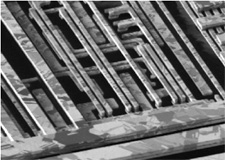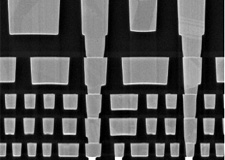Copper for Faster Chips
Your next PC will operate much faster because of copper. To form all internal interconnections in microprocessors, the semiconductor industry is converting smoothly to copper instead of aluminum, according to a report in ZDNet, the Internet site for Ziff-Davis Publishing Company, New York.
As more and more transistors - the tiny pathways that make up semiconductors - are put into chips, the wires necessarily become shorter and thinner. Therefore, designers had to turn to copper. Because copper is a much better conductor than aluminum, thinner conductors can be used. In addition, copper is less prone to undesirable electromigration. Aluminum suffers from this deficiency because a dense, constant flow of current through an aluminum wire can dislocate some of its atoms, creating a void. Voids can result in chip failure. Moreover, copper dissipates heat more readily than aluminum. That's a big bonus as the chip components become more compacted.


By substituting higher-conductivity copper for aluminum for interconnections in microprocessors like this one from Intel, chip makers can create even faster products. In addition to increasing the chip's speed, use of copper helps limit heat generation, a growing problem with such dense devices.
The substitution of copper for aluminum, required overcomingsubstantial challenges in forming copper wires. For example, copper wires can't be made by sputtering, which is the easy, effective way aluminum wires are created in making chips. Designers had to turn to an electroplating wire-creation process originally developed for tungsten chips about ten years ago.
There was a second challenge: unlike aluminum, copper diffuses quickly through silicon chips, which adversely changes its electrical properties. This problem was solved by applying insulating layers, usually made of tantalum, to separate the silicon from the copper wires yet still keep them bonded together where needed.
The first chip to use copper wires was introduced by IBM in September, 1997. Now, all the leading chip makers are switching successfully from aluminum to copper, according to ZDNet. While copper holds an important place in recent advances in the computer industry, there is no fear that this will lead to a shortage in the worldwide supply of copper. The entire industry consumes less than a ton of copper annually.
Also in this Issue:
- Copper for Faster Chips
- Promoting Efficient Motors
- Copper Protects Costly Gear
- Copper Building Materials Seen by Millions
- Attention Scrap Copper Purchasers
- Bronze Spiders Makes Manhattan Appearance
- Copper is Cool for Motors
